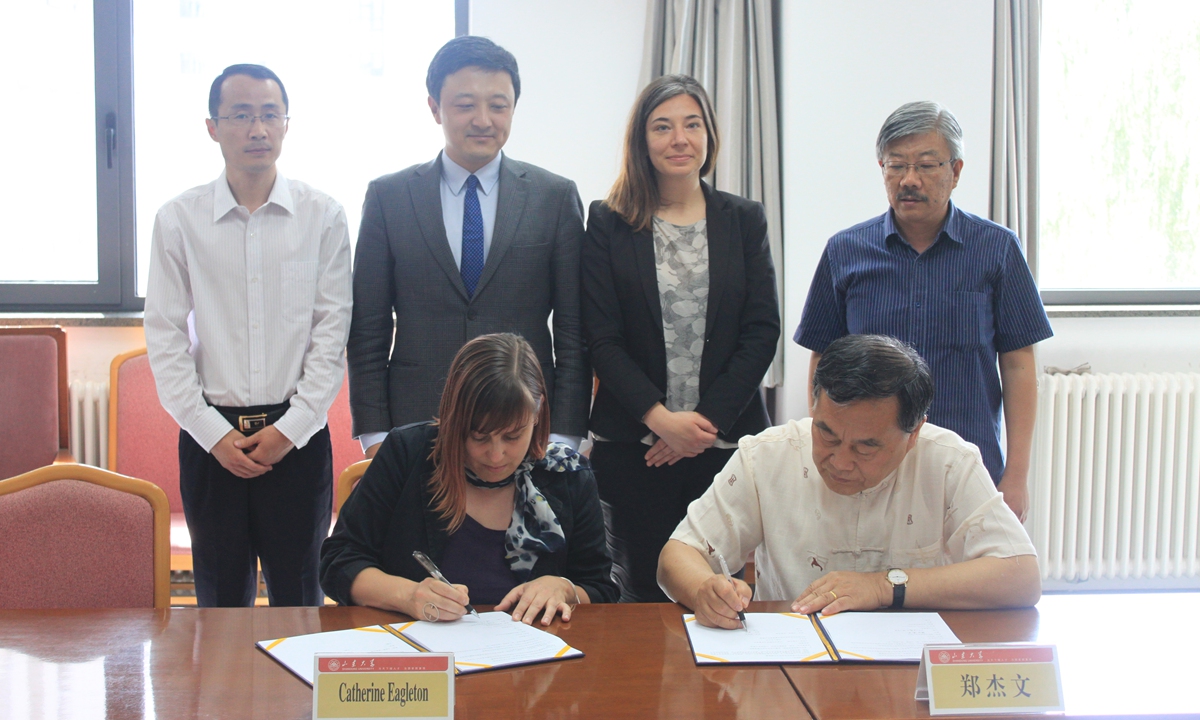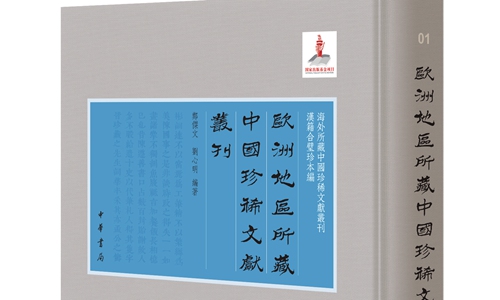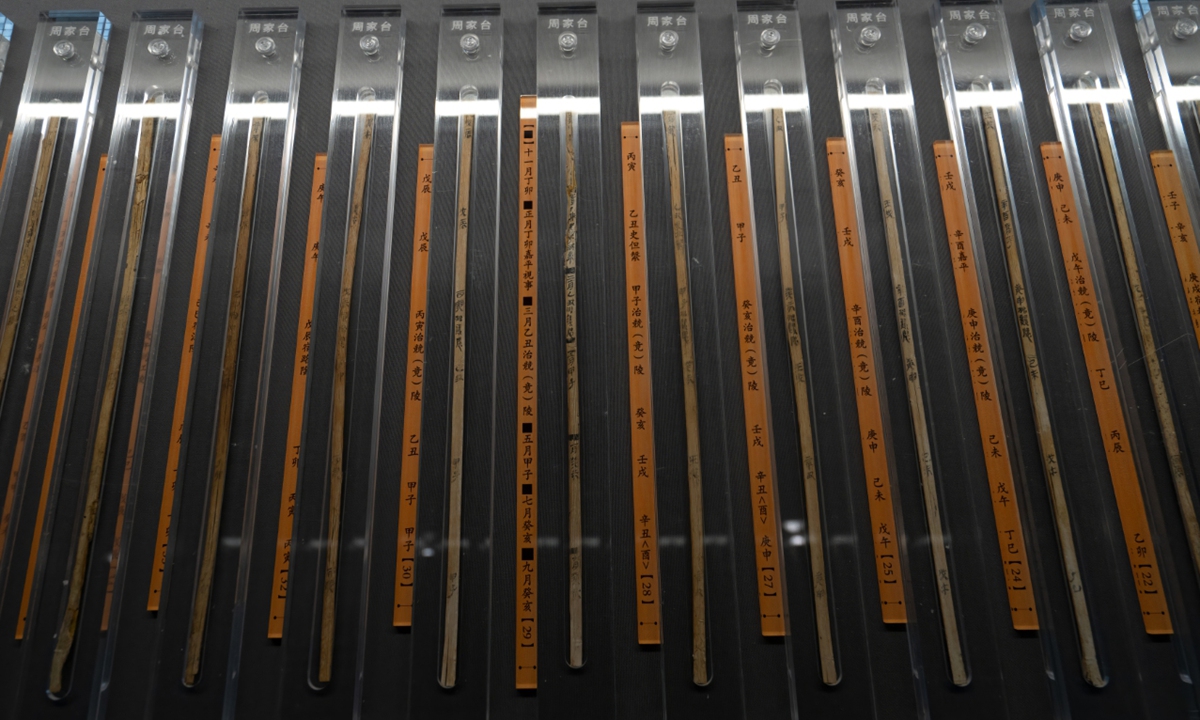
Professor Zheng Jiewen (front right) of Shandong University signs the agreement with Catherine Eagleton (front left), director of Libraries and Museums, Univeristy of St Andrews in the UK.Photo: Courtesy of the International Sinological Research Center of Shandong University
Amid the vast expanse of traditional Chinese culture, ancient texts stand as crucial carriers of literature, history, philosophy, and art.
However, for various reasons, a significant number of Chinese texts found their way beyond the borders of the "Middle Kingdom," leaving China with versions and varieties missing from its collections.
In 2017, the Integration of Chinese Ancient Books project was initiated, aiming to comprehensively survey the status of ancient Chinese texts held abroad and conduct comprehensive research on versions and varieties missing from China.
With the participation of over 300 academic teams and more than 1,000 experts and scholars, the International Sinological Research Center of Shandong University plays a central role in this colossal endeavor.
The goal is to enhance the storage system of ancient Chinese texts, providing vital documentary support for domestic cultural construction and international cultural exchange.
Starting with "Zi" in the Four Branches of Ancient Chinese Literature Jing, Shi, Zi and Ji.
This system traces its roots to the project's inception — the "Zi Hai" project's organization and research.
The decision to start with the "Zi" section has historical significance for the university as Professor Zheng Jiewen has since been named the leading researcher in charge of delving deeper into the study and researches.
Wide research
Due to the daily limit on library borrowings, researchers have sometimes spent hours traveling just to lay eyes on a few Chinese classics in the past.
The cataloging team's efforts were monumental, with members working across the globe, ensuring a comprehensive understanding of the status of Chinese classics held overseas.
"The project has undertaken a comprehensive survey of 1,988 overseas libraries in 95 countries and regions, in collaboration with domestic and international research institutions, shedding a light on the status of approximately 1.35 million ancient Chinese texts held abroad," Professor Shan Chengbin, the team leader of the cataloging team, told the Global Times via a written reply.
The center noted that the project is actively engaged in the verification and cataloging of Chinese classics held by 554 libraries abroad, successfully compiling version catalogs for over 480,000 overseas ancient Chinese texts.
The meticulous efforts of experts in cross-referencing information from domestic and international ancient Chinese texts have led to the identification of nearly 1,900 rare Chinese classics missing from China.
Remarkably, more than 2,000 of these have been replicated and returned, including significant singular editions like the Qing Dynasty (1644-1911) copy of Ming Dynasty official Fu Jun's manuscript on iron metallurgy - housed at St Petersburg University in Russia - which provides a comprehensive insight into 16th-century Chinese iron metallurgy techniques.
"International cooperation plays a crucial role in advancing the project as it facilitates maximum convenience for foreign experts and scholars, granting them an access to universities, libraries, and other research facilities for comprehensive reviews," said Professor Zheng Jiewen, the chief expert of the project.
Digitalization matters
Recognizing the need for preservation and accessibility, the research center has embarked on the digitization of ancient text, establishing a comprehensive ancient text database.
Three databases for the documented texts are currently in development: The Global Chinese Ancient Texts Catalog Database, the Overseas Chinese Ancient Texts Full-Text Image Database and the Database of Chinese Classics and Sinology Research Publications.
"By utilizing these databases, the project aims to centralize information on ancient Chinese texts globally, digitize the full-text images of overseas Chinese ancient texts, and compile a repository of research publications in the field of Chinese classics and Sinology," Zheng said.
All functionalities for these three databases have been developed and are currently undergoing testing, according to the center, with plans to commence their operational use in the near future.
This strategic initiative not only facilitates streamlined access to a wealth of cultural heritage but also reinforces the project's commitment to advancing research and scholarship in the realm of Chinese classics and Sinology.
Utilizing modern technological means to breathe new life and vitality into outstanding cultural heritage is imperative. The protection of cultural heritage is inseparable from advanced modern technology.
"Establishing data cataloging platforms and databases allows us the regenerative repatriation of rare Chinese classics discovered overseas but are missing in China," Zheng said.
Through this innovative approach, cultural heritage undergoes a process of creative transformation and innovative development, as the project could redefine these cultural treasures, ensuring their preservation and continued relevance in the modern era."
Future vision
The project envisions future plans to promote its achievements through public exhibitions as well as forums.
"The exhibitions will showcase rare Chinese classics missing in China, emphasizing the documentary, cultural and artistic value of overseas ancient Chinese texts," Zheng said.
"The objective is to bring these cultural treasures closer to the public, fostering an understanding of the current status of repatriation efforts for ancient texts in China.
In the second half of 2024, the project will collaborate with experts from North Korea to unveil the first batch of information regarding ancient Chinese texts stored in the country, the center said. This move marks the inaugural showcase of ancient Chinese texts held in North Korea, highlighting a significant step in cross-border cooperation and the unveiling of cultural treasures previously inaccessible to the public.
Currently, the university has signed cooperation agreements with more than 100 libraries or collections worldwide。
"We hope that more and more young people can participate in the project, to understand and feel the spiritual power contained in our ancient books," Zheng said.

A publication of the project Photo: Courtesy of the International Sinological Research Center of Shandong University



